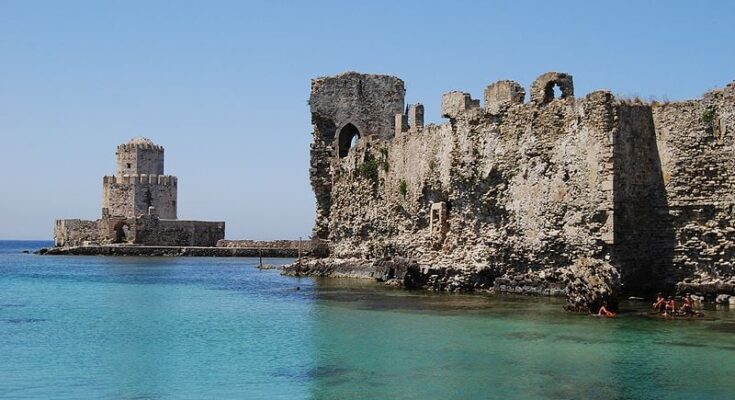Methoni and Koroni, two quintessential Greek seaside towns, are home to Venetian castles, countless pristine sandy beaches, and lush landscapes.
The two towns are intertwined in myriad ways although they are approximately a thirty minute drive away from each other, and are located on the southwestern tip of the Peloponnese, a place brimming with history and natural beauty.
Although the seaside Venetian castles in the Greek towns steal the spotlight, the countless traditional Greek restaurants and businesses, rich history, and amazing beaches with turquoise waters will win visitors over for good.

Seaside town of Koroni and its castle date back to 13th century
Koroni is known for its medieval castle, but the town was actually established in antiquity, as it was mentioned by the famous traveler Pausanius in the 2nd century AD.
It is unknown when exactly the castle of Koroni was built, but it must have been after the Fourth Crusade in the year 1204 when the entire area of the Peloponnese was claimed by Frankish crusader William of Champlitte.
The town later passed into Venetian hands in 1209 and Koroni was further fortified by the Ottomans in the 16th century.
The town, which has about 1,100 residents, still has a distinct medieval atmosphere.
In the central square stands the imposing Cathedral of Agios Dimitrios, a basilica after the Eptanisian style, built in 1864.

The large Venetian castle, which stands on top of the hill, offers magnificent panoramic views.
Inside the castle the “Old Calendar” monastery of Agios Ioannis stands beside the ruins of a Byzantine church.
Below the castle, encircled in palm trees, is the church of Panagia Eleistra, in a secluded spot where there are beautiful views down to the beach of Koroni.

Koroni is home to traditional Greek businesses along with iconic castle
In the small palm-tree grove, visitors will find the statue of Bishop Gregorios, and the building that is home to the historical and archaeological museum of Koroni.
The Maniatakeion Foundation also stands out in the center of town. A cultural center created for the promotion of Koroni, it hosts interesting public events and periodic art exhibitions.
In conjunction with the municipality, the cultural center co-organizes the Mediterranean Food Festival, which has been included on UNESCO’s list of events with “Intangible Cultural Heritage.”
Along the waterfront of the seaside town, one finds a wide variety of Greek restaurants, picturesque fish tavernas, patisseries, and ouzo shops that serve their delicacies by the water.
Two traditional Greek barber shops are located inside the narrow picturesque alleyways, as well.
There are several magnificent beaches in Koroni, some with fine golden sand and some smaller, pebbled beaches, promising endless hours of rest and relaxation.
Some of the better ones are the beach at Kolonides with its fine sand surrounded by trees, the pebble beach of Gargarou, and Zaga, Memi and Kalamaki Beaches.

Methoni features one of Greece’s most important castles
The Castle of Methoni, one of the most important fortifications in Greece, is a beautiful archaeological site that stretches across approximately 93 acres and ends in the Bourtzi, an octagonal tower surrounded by the sea.
Visitors can walk around the entire area, traveling through the many historical periods that the town experienced.
Beginning from the imposing gate of the Castle, travelers continue along the vaulted buildings of two preserved Ottoman baths and can stroll along the base of a ruined minaret.
Throughout its history, Methoni was an important castle city for many empires. The inhabitants of the two towns unfortunately experienced two Venetian occupations as well as two Turkish occupations.
The remnants of these historic eras are felt and clearly visible throughout Methoni.
In fact, the first buildings of the modern town, the construction of which began in 1828, were built using stones from the old houses inside the castle.

The seaside town is home to rich folklore and tradition
Today the town, which has expanded next to the castle, has 1,200 inhabitants. The town’s folklore understandably revolves around the great fortification.
Any visitor to Methoni will certainly hear the story of Ioannis Koutroulis, a knight who lived at the end of the 14th century and waited seven years for his paramour to obtain a divorce so that he could marry her. This story has granted us the famous Greek phrase “The Wedding of Koutroulis” (Toυ Κουτρούλη ο γάμος).

Every year, on the three Lenten days beginning on Clean Monday, the famous wedding is reenacted with authentic Venetian costumes borrowed from the cloakroom of the Cultural Association of Methoni, which recently established a foustanella workshop to preserve the art of sewing this most traditional costume.
In the summer, music and folk festivals take place in the castle’s moat.
There are several beautiful beaches in Methoni, as well.
Methoni Beach is a small pebble beach with crystal-clear, blue waters and a spectacular view of the castle on the right.

Lampes, on the road from Methoni to Foinikounda, has two beautiful secluded beaches for those who prefer seclusion.
Mavrovouni, adjacent to Foinikounda, is a beautiful sandy beach with water sports, camping, tavernas and cafes.
Foinikounda is a long sandy beach in the village of Foinikounda quite close to Methoni; its clear blue waters attract many visitors. Travelers will find several fine cafes and tavernas along the beach there.
Loutsa Beach and Tsapi Beach are two more wonderful sandy stretches nearby, luring travelers to dive into their crystal-clear waters.
Papa, or Limna, Cove is a wonderful shallow inlet on the way to Pylos, which is ideal for swimming, fishing, and enjoying the glowing colors of sunsets over the water.



